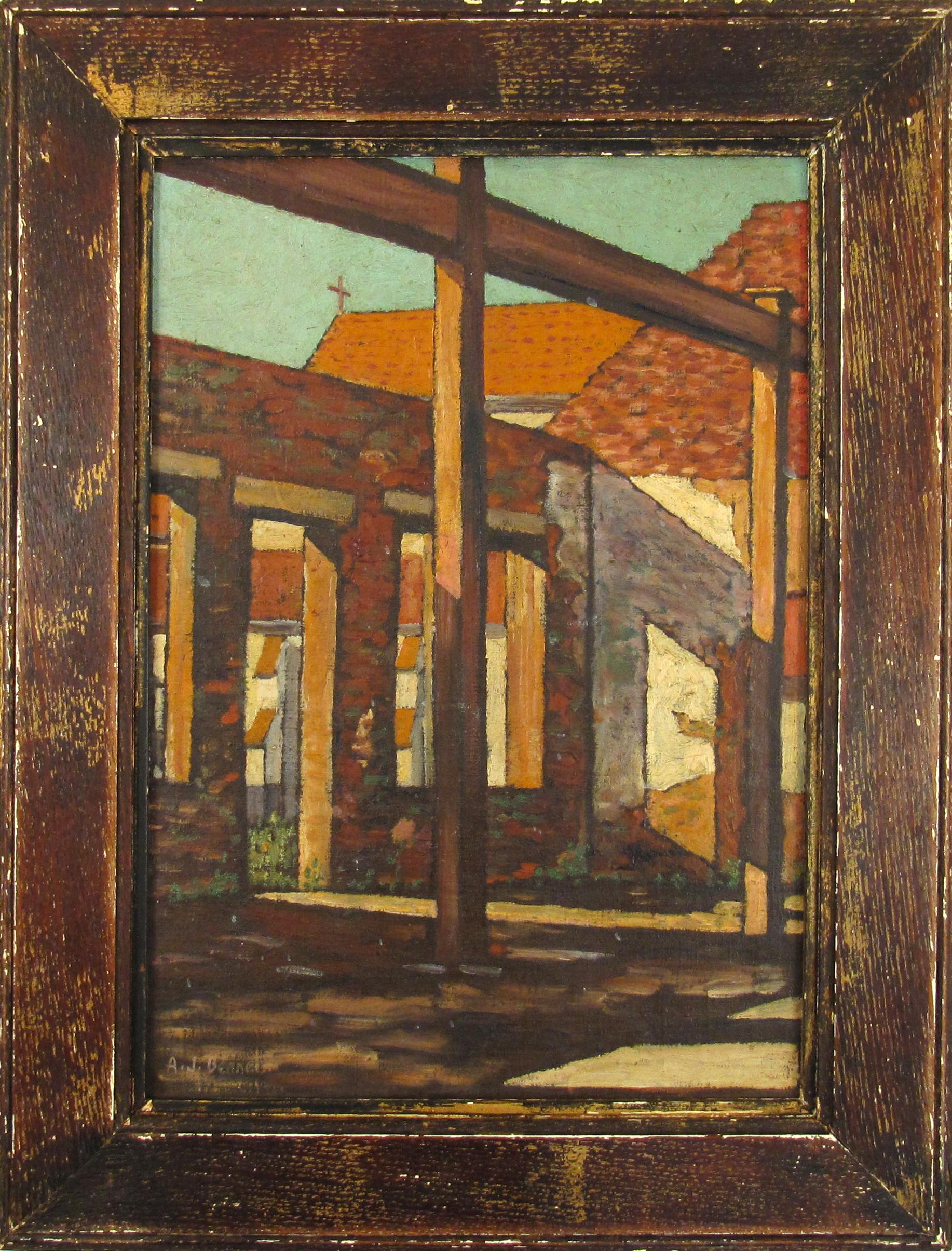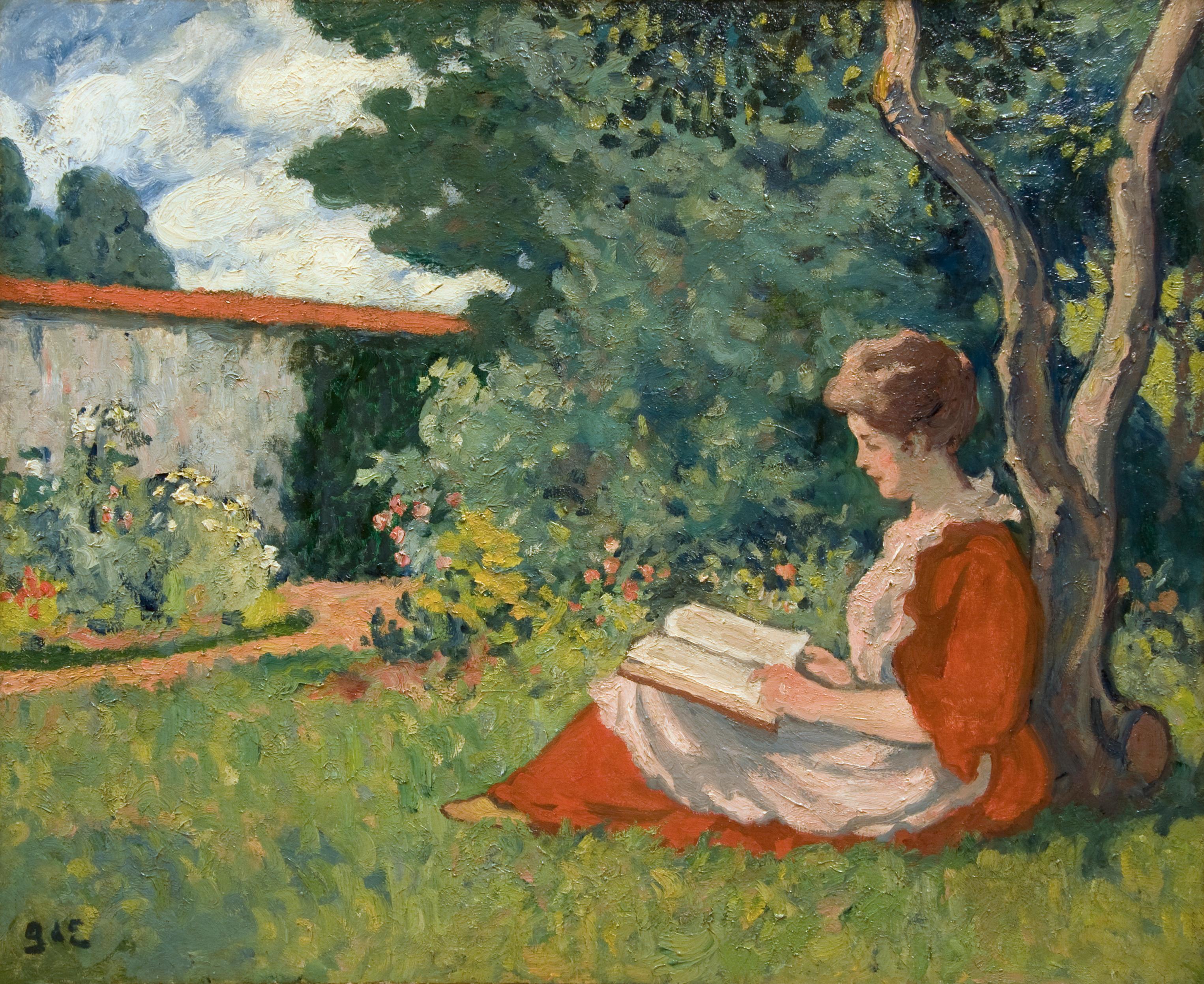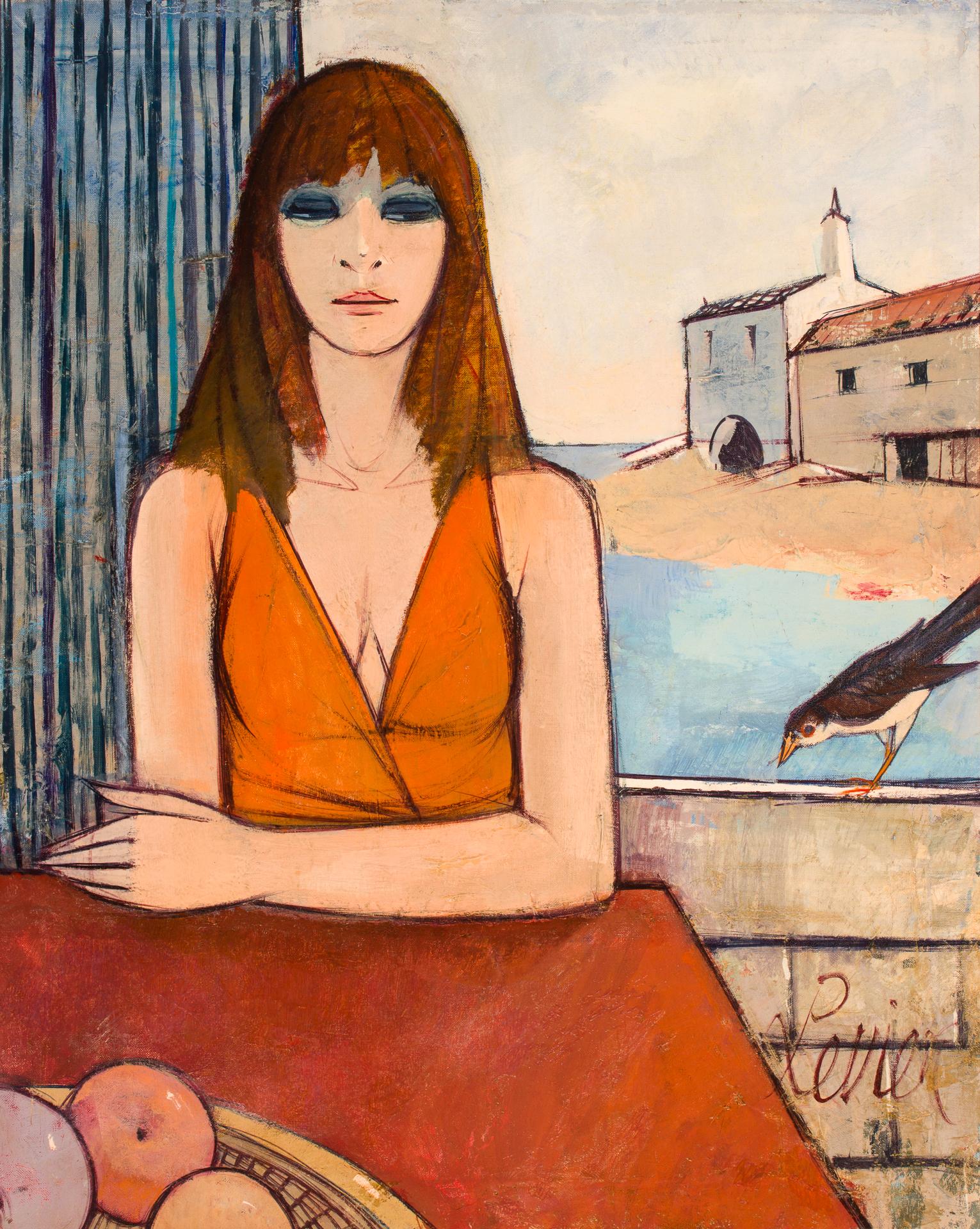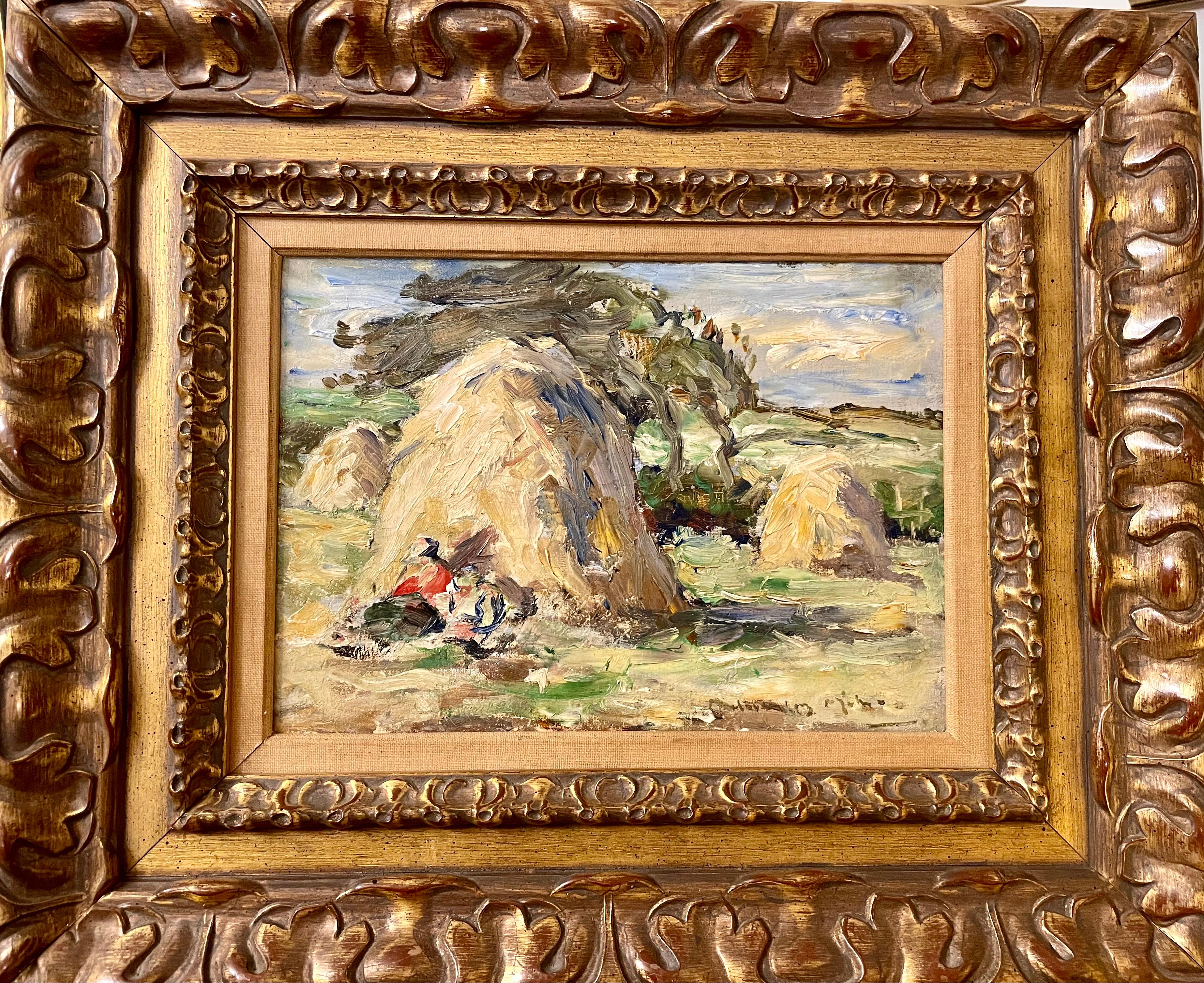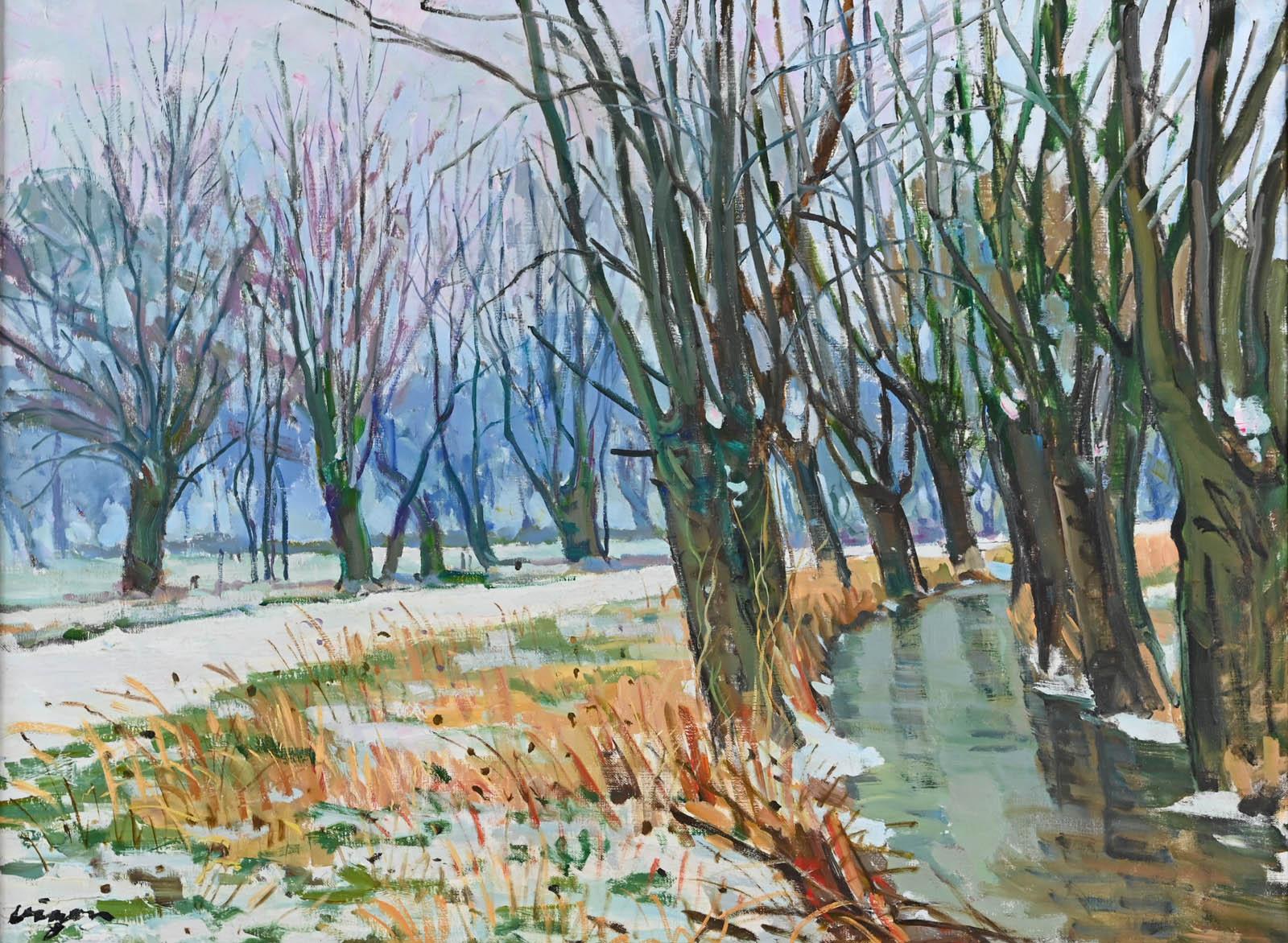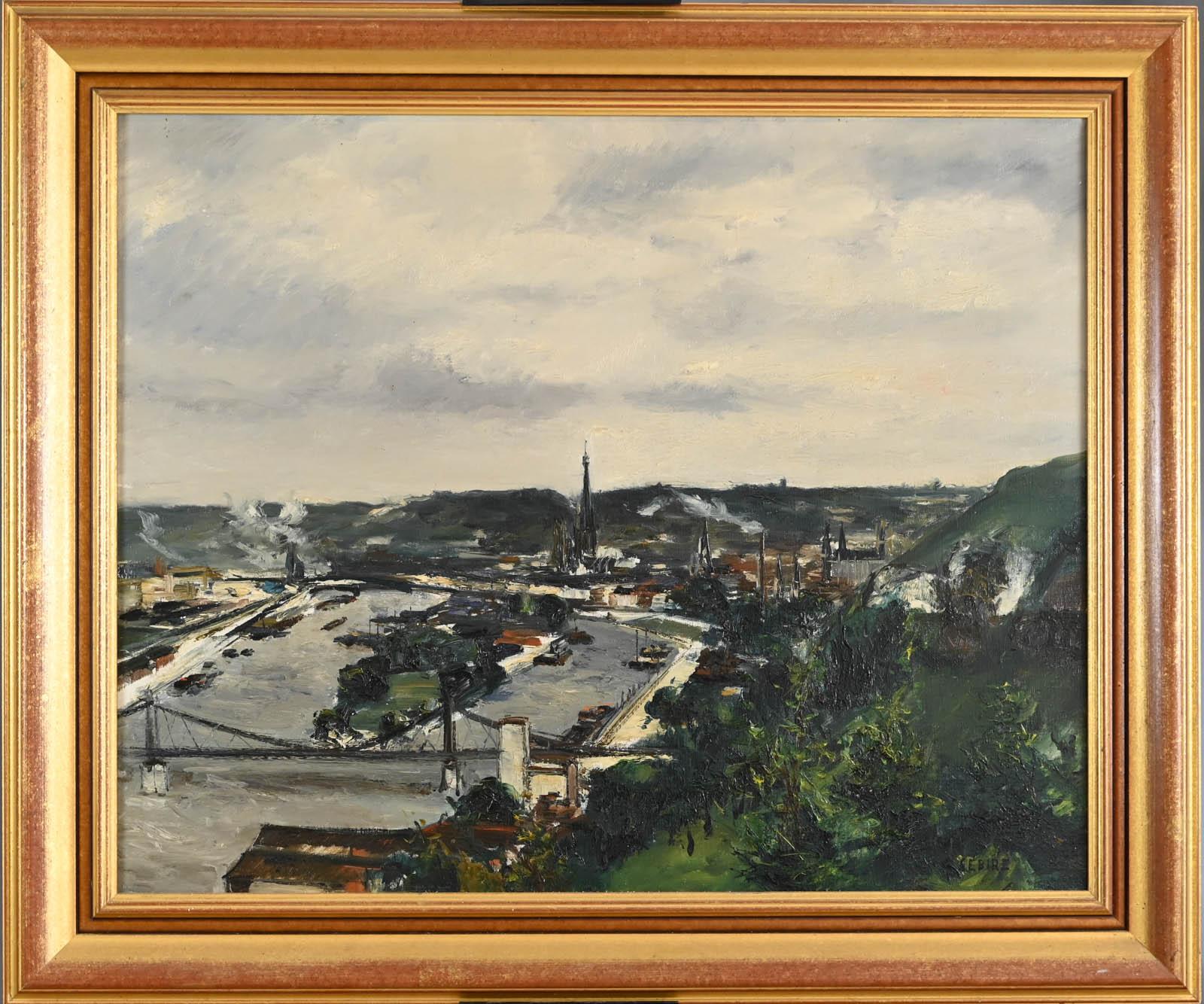Items Similar to Rivière et Saules by Paulémile Pissarro - Post-Impressionist river scene
Want more images or videos?
Request additional images or videos from the seller
1 of 9
Paul Emile PissarroRivière et Saules by Paulémile Pissarro - Post-Impressionist river scene1931
1931
About the Item
Rivière et Saules by Paulémile Pissarro (1884-1972)
Oil on canvas
46.1 x 55.2 cm (18 ¹/₈ x 21 ³/₄ inches)
Signed and dated lower left Paulémile-Pissarro-1931
Titled on the reverse
Provenance
Private collection, France
This work is accompanied by a certificate of authenticity from Lélia Pissarro.
Artist biography
Paulémile Pissarro, Camille Pissarro’s youngest son, was born in Éragny in 1884 where he was brought up within the creatively fertile environment of his family home and, encouraged by his father, began drawing at an early age. Paulémile’s godfather was Claude Monet, who became his teacher and legal guardian after Camille’s death in 1903.
In 1905 Paulémile exhibited at the Salon des Indépendants for the first time. Although his father had supported Paulémile’s desire to be an artist, his mother was eager for him to learn a more practical trade. Therefore in 1908 he put aside his artistic pursuits to work as an automobile mechanic and test-driver, then later as a lace and textile designer, allowing him only a limited time to paint. Paulémile only fully dedicated himself to painting following a letter from his brother Lucien in London, who wrote to invite him to take part in an exhibition held in London. Subsequent to the successful sale of a number of watercolours he had sent over, the young artist became inspired to leave the textile factory and pursue a career in art.
By the 1920s Paulémile had become an established Post-Impressionist artist in his own right, spending the summer months escaping from Paris on painting trips with fellow artists Kees Van Dongen, Raoul Dufy, Maurice de Vlaminck and André Dunoyer de Segonzac. In 1922 Paulémile purchased a house in Lyons-la-Forêt, a small village within the region of his hometown of Éragny and Giverny, where he moved in with his first wife Berthe Bennaiche. During this time, he developed a form of Cubism inspired by Paul Cézanne whom he dearly admired, creating some wonderful paintings of the river Eure and its surrounding villages. There he formed a close friendship with his neighbour, the famous Art Deco designer Émile-Jacques Ruhlmann, who designed a stunning Art Deco studio for Paulémile adjacent to his house.
In 1930 he visited and fell in love with the Swiss Normandy area in the Calvados region, in particular the River Orne which runs through the valley adjacent to the villages of Clécy and St. Remy. The combination of rolling hills, bold meadows and the calm river weaving its way through the landscape offered Paulémile a new burst of inspiration. With his second wife Yvonne Beaupel, Paulémile eventually moved to Clécy in 1935, where he would remain for the rest of his life. Of their three children, both
H. Claude and Yvon also became artists.
With his house backing on to the river Orne, Paulémile developed a new way of working using a boat as a floating studio, where he spent countless days painting the calm waters from between the riverbanks. Here the influence of his godfather Claude Monet became apparent, particularly in Paulémile’s depiction of water, which was revolutionised by the Impressionist icon. He also applied Monet’s lessons in horticulture to the creation of an abundant garden, offering him many more motifs for his new paintings. Alongside these river landscapes, he also painted the neighbouring hay fields, various snow scenes, some interiors and still lives. The most ambitious work in his oeuvre was a fresco painted on all four walls of his own dining room, depicting the adjacent river in which he includes family members, neighbours and friends.
In 1967 Paulémile had his first one-man show in the United States at Wally Findlay Galleries in New York. This led to widespread recognition and a degree of professional success that few Pissarro artists knew during their lifetime. Since his death in 1972, Paulémile remains one of the best known of Camille’s sons.
- Creator:Paul Emile Pissarro (1884-1972, French)
- Creation Year:1931
- Dimensions:Height: 18.15 in (46.1 cm)Width: 21.74 in (55.2 cm)
- Medium:
- Movement & Style:
- Period:
- Condition:
- Gallery Location:London, GB
- Reference Number:1stDibs: LU261210430262
About the Seller
5.0
Recognized Seller
These prestigious sellers are industry leaders and represent the highest echelon for item quality and design.
Platinum Seller
These expertly vetted sellers are 1stDibs' most experienced sellers and are rated highest by our customers.
Established in 1964
1stDibs seller since 2015
95 sales on 1stDibs
Typical response time: 4 hours
Associations
Society Of London Art Dealers
- ShippingRetrieving quote...Ships From: London, United Kingdom
- Return PolicyA return for this item may be initiated within 7 days of delivery.
More From This SellerView All
- L'Île aux Oiseaux by Paulémile Pissarro - Landscape oil paintingBy Paul Emile PissarroLocated in London, GB*UK BUYERS WILL PAY AN ADDITIONAL 20% VAT ON TOP OF THE ABOVE PRICE L'Île aux Oiseaux by Paulémile Pissarro (1884-1972) Oil on canvas 61 x 47.6 cm (24 x ...Category
1930s Post-Impressionist Figurative Paintings
MaterialsCanvas, Oil
- Les Bateaux Lavoir, Paris by Georges Manzana Pissarro - River sceneBy Georges Henri Manzana PissarroLocated in London, GB*UK BUYERS WILL PAY AN ADDITIONAL 5% IMPORT DUTY ON TOP OF THE ABOVE PRICE Les Bateaux Lavoir, Paris by Georges Manzana Pissarro (1871-1961) Oil on canvas 38 x 46 cm (15 x 18 ¹/₈ in...Category
Early 1900s Post-Impressionist Figurative Paintings
MaterialsCanvas, Oil
- Chemin de la Vallée, Oil on Canvas by Paulémile PissarroLocated in London, GBChemin de la Vallée by Paulémile Pissarro (1884 - 1972) Oil on canvas 46 x 61 cm (18 ¹/₈ x 24 inches) Signed lower left, Paulémile. Pissarro- Signed and titled on the reverse Pro...Category
Mid-20th Century Post-Impressionist Landscape Paintings
MaterialsOil, Canvas
- Femmes Maroccaines by Marcel Dyf - River scene paintingBy Marcel DyfLocated in London, GBFemmes Maroccaines by Marcel Dyf (1899-1985) Oil on canvas 60.5 x 73 cm (23 ⁷/₈ x 28 ³/₄ inches) Signed lower left, Dyf 1957Category
1950s Post-Impressionist Landscape Paintings
MaterialsCanvas, Oil
- Le Coup de Vent by Paulémile Pissarro - Post-Impressionist oil river sceneBy Paul Emile PissarroLocated in London, GBLe Coup de Vent by Paulémile Pissarro (1884-1972) Oil on canvas 65 x 92 cm (25⁵/₈ x 36¹/₄ inches) Signed lower left, Paulémile Pissarro; signed and titled on the reverse Executed cir...Category
1940s Post-Impressionist Landscape Paintings
MaterialsCanvas, Oil
- La Mare et les Vieux Saules by Paulémile Pissarro, Post-Impressionist riverscapeBy Paul Emile PissarroLocated in London, GB*UK BUYERS WILL PAY AN ADDITIONAL 5% IMPORT DUTY ON TOP OF THE ABOVE PRICE La Mare et les Vieux Saules by Paulémile Pissarro (1884-1972) Oil on canvas 46 x 55 cm (18 ¹/₈ x 21 ⁵/₈ i...Category
1930s Post-Impressionist Landscape Paintings
MaterialsCanvas, Oil
You May Also Like
- A. J. Bennett - Light and Shade - Post Impressionist Painting, South Africa 1919Located in Meinisberg, CHA. J. Bennett (South African, fl. Early 20th century) Light and Shade • Oil on canvas artist board ca. 42.5 x 29.5 cm • Later frame ca. 53.5 x 41 cm Worldwide shipping is complime...Category
1910s Post-Impressionist Figurative Paintings
MaterialsCanvas, Oil, Board
- Femme lisant dans un jardinBy Georges d'EspagnatLocated in Washington, DCSigned with monogram lower left * The Robert Lehman Collection at the Metropolitan Museum of Art contains more paintings (nine) by Georges D’Espagnat than any other nineteenth- or ...Category
1910s Post-Impressionist Figurative Paintings
MaterialsCanvas, Oil
- PrintempsBy Charles LevierLocated in Costa Mesa, CAA beautiful woman sits at an open window, gazing down at a small bird who has landed nearby in this serene portrait by Charles Levier. Warm orange tones are played off their complements in shades of blue, the artist utilizing several different layers of oils to create a subtle and relaxed view of a spring day near the sea. Beyond the window a small chapel sits on a peninsula, surrounded tranquil blue waters. This work, like many of Levier's, belongs to the French figurative movement of the Glorious Thirty (Les Trente Glorieuses) - the golden period of thirty years after WWII which were a time of great hope and prosperity in France. Inspired by Hollywood cinema, Charles Levier sought harmony in composition and purity of color and form. His said that his creations represented "a light and delicate world, of dark and subtle shades and colors." Levier worked in a somewhat abstracted, cubist style. Additionally he often employed the French technique of "cloisonnism" (after the French for "partition"), a style of post-Impressionist painting with bold and flat forms separated by dark contours, also seen in this work. The term was coined by critic Edouard Dujardin on the occasion of the Salon des Indépendants, in March 1888 and was commonly used by artists like Émile Bernard, Louis Anquetin, Paul...Category
Mid-20th Century Post-Impressionist Figurative Paintings
MaterialsCanvas, Oil
- Haystack with Resting FiguresBy John Maclauchlan MilneLocated in Hillsborough, NCScottish artist John Maclauchlan Milne, RSA, (1885-1957) is a contemporary of Scottish Colourists Peploe, Fergusson, Cadell and Hunter. Like the...Category
1920s Post-Impressionist Landscape Paintings
MaterialsCanvas, Oil
- Le port de DieppeBy Jacques BouyssouLocated in LE HAVRE, FRJacques BOUYSSOU (1926-1997) Le port de Dieppe, 1969 Oil on original canvas, in perfect condition, original canvas. Large size : 90 x 118 cm Signed lower left Vintage frame Provena...Category
1960s Post-Impressionist Landscape Paintings
MaterialsCanvas, Oil
- Neige à Saint Martin de BoschervilleLocated in LE HAVRE, FRLouis Jacques VIGON (1897-1985) Neige à Saint Martin de Boscherville Oil on canvas Size: 60 x 81cm Signed lower left. Titled on the back Provenance : - Tuffier Gallery, Les Andelys...Category
Mid-20th Century Post-Impressionist Landscape Paintings
MaterialsCanvas, Oil
Recently Viewed
View AllMore Ways To Browse
4 Post
Scene Four
Four Post
Four Posted
River Scene
Art Et Design
Art Deco Postes
River Scene Paintings
Impressionist Paris Scene
Vintage Love Scenes
Framed Post Impressionist Landscape
Impressionist Painting Of Rivers
Art Paris Salon Scene
Small Framed Art Impressionist
Impressionist Paris Scene Landscape
Fresco Paint
Dining Scene Art
Trading Post
